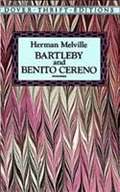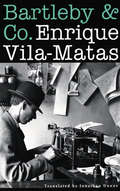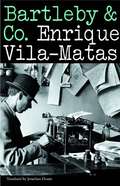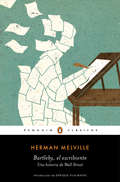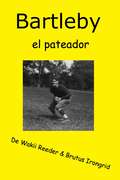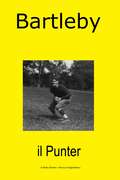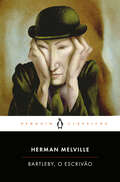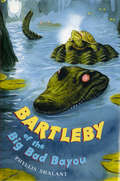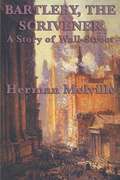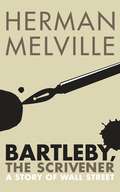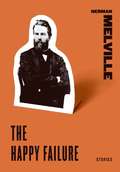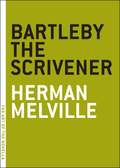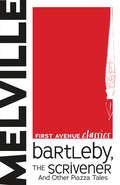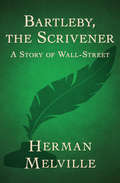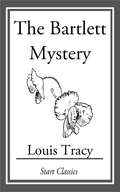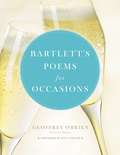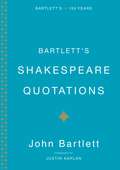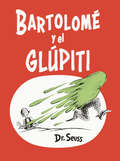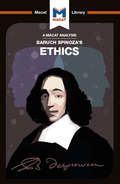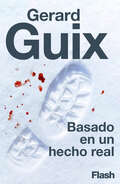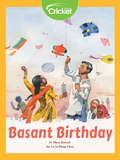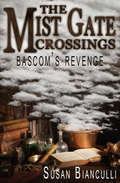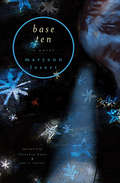- Table View
- List View
Bartleby and Benito Cereno
by Herman Melville Stanley ApplebaumTWO STORIES by the great American writer Herman Melville. "Bartleby" reflects the author's family knowledge of the business world and "Benito Cereno" draws heavily on his seafaring experiences.
Bartleby & Co.
by Jonathan Dunne Enrique Vila-MatasA marvelous novel by one of Spain's most important contemporary authors, in which a clerk in a Barcelona office takes us on a romping tour of world literature. In Bartleby & Co., an enormously enjoyable novel, Enrique Vila-Matas tackles the theme of silence in literature: the writers and non-writers who, like the scrivener Bartleby of the Herman Melville story, in answer to any question or demand, replies: "I would prefer not to." Addressing such "artists of refusal" as Robert Walser, Robert Musil, Arthur Rimbaud, Marcel Duchamp, Herman Melville, and J. D. Salinger, Bartleby & Co. could be described as a meditation: a walking tour through the annals of literature. Written as a series of footnotes (a non-work itself), Bartleby embarks on such questions as why do we write, why do we exist? The answer lies in the novel itself: told from the point of view of a hermetic hunchback who has no luck with women, and is himself unable to write, Bartleby is utterly engaging, a work of profound and philosophical beauty.
Bartleby & Co.
by Enrique Vila-Matas Jonathan DunneTranslated from the Spanish by Jonathan Dunne. In Bartleby & Co., Enrique Vila-Matas tackles the theme of silence in literature: the writers and non-writers who, like the scrivener Bartleby of the Herman Melville story, in answer to any question or demand, replies: "I would prefer not to." Addressing such "artists of refusal" as Robert Walser, Robert Musil, Arthur Rimbaud, Marcel Duchamp, Herman Melville, and J. D. Salinger, Bartleby & Co. could be described as a meditation: a walking tour through the annals of literature. Written as a series of footnotes (a non-work itself), Bartleby embarks on such questions as why do we write, why do we exist? The answer lies in the novel itself: told from the point of view of a hermetic hunchback who has no luck with women, and is himself unable to write, Bartleby is utterly engaging, a work of profound and philosophical beauty.
Bartleby, el escribiente: Una historia de Wall Street (Akal Bolsillo Ser. #39)
by Herman MelvilleConmemoramos el bicentenario del nacimiento de Melville con la edición de una de sus obras más célebres que incluye, además, una introducción de Enrique Vila-Matas. «Preferiría no hacerlo -repetí yo como si fuera su eco, levantándome muy alterado y cruzando la habitación de una zancada-. ¿Qué quiere decir?» Considerada una obra maestra de la narración corta, Bartleby, el escribiente constituye una pieza anticipatoria de la literatura existencialista y del absurdo. A través del protagonista, un escribiente que se enfrenta a las demandas de la realidad con una inquietante respuesta, «preferiría no hacerlo», el estoicismo, la ironía, el humor y el sordo desasosiego alegórico presente en la obra del Melville se aúnan para expresar la obstinación del ser humano en su afán de obtener respuesta a las grandes preguntas o, al menos, seguir buscándolas. Esta edición presenta una traducción de María José Chulia y una brillante introducción de Enrique Vila-Matas, que reflexiona sobre esta historia que tiene un claro paralelismo con Kafka y ha influenciado a autores como Beckett, Camus, Gombrowicz o el mismo Vila-Matas.
Bartleby, el pateador
by Wakii ReederEsta historia toma el "Bartleby el escribiente" de Melville y lo mezcla con el fútbol de la escuela secundaria para hacer una historia disparatada de un jugador que saca de quicio al entrenador. Si has jugado al fútbol en la escuela secundaria (o en cualquier otro deporte), te encantará esta historia. El libro incluye una guía de discusión. Este libro está dedicado a mis entrenadores de fútbol. Especialmente a los que he contribuido a su calvicie y me han regañado cuando me lo he buscado. Entre los personajes deformados de Melville se encuentran: Bartleby, Ginger Nut, Grubman, Nippers, Turkey, Ahab, Ishmael, Stubb, Queequeg, Starbuck, Father Maple, Tashtego, Daggoo, Flask y Yorpy.
Bartleby il punter
by Wakii Reader Brutus GrigliadiferroQuesto racconto prende il celebre “Bartleby lo scrivano” di Hermann Melville, lo rimescola con l’ambiente del football americano liceale e ne trae una storia piuttosto folle in cui un giovane giocatore fa uscire completamente di testa il suo allenatore. Se avete praticato il football, o magari il rugby, o qualunque altro sport, questo libro vi piacerà sicuramente. Il libro include un questionario. Dedico quest’opera ai miei allenatori di football, specialmente quelli a cui ho accelerato la calvizie e che mi hanno urlato contro quando me lo meritavo. I personaggi ripresi e modificati includono: Bartleby, Ginger Nut, Grubman, Nippers, Turkey, Achab, Ismaele, Stubb, Queequeg, Starbuck, padre Mapple, Tashtego, Daggoo, Flask e Yorpy.
Bartleby, O Escrivão
by Herman MelvilleResponsável por uma tarefa profissional rotineira e desinteressante, Bartleby vai trocando o entusiasmo inicial por uma progressiva e insistente recusa em desempenhar as funções para que foi contratado. Uma obra-prima da literatura americana com tradução de Tatiana Faia e introdução de Pedro Sobrado. »"Bartleby, podia dar um pulo aos correios e ver se há alguma coisa para mim?" "Preferia que não."» Num escritório em Wall Street, um reconhecido advogado contrata um jovem escrivão, Bartleby, para ajudar a dar vazão ao incremento de trabalho. De início, Bartleby revela-se exímio no desempenho das suas funções de copiar documentos legais. Um dia, porém, quando é requisitado para rever um texto, o escrivão declina o pedido declarando, para absoluta surpresa do advogado e do leitor, que "preferia que não". A tensão vai crescendo à medida que Bartleby se nega a cumprir cada vez mais tarefas, não deixando muitas opções ao advogado e narrador desta história singular. Aclamado como um precursor do Modernismo e do Absurdo na literatura, Bartleby, o Escrivão, publicado originalmente em 1853 na Putnam's Monthly Magazine, é apontado como um dos mais notáveis e influentes contos da literatura americana, onde Herman Melville reflete sobre uma sociedade em acelerada transformação e desumanização.
Bartleby of the Big Bad Bayou
by Phyllis ShalantBartleby, the red-eared turtle, and Seezer, the American alligator, have swum the Mighty Mississippi to reach bayou country, their true home. But when they find the creek where Seezer was born, they discover it's ruled by Old Stump-a giant gator with a gargantuan appetite. Fortunately, Bartleby has a knack for making friends, and there is soon a new crew to count on, including a red-ear named Lucky Gal. Still, life in bayou country is full of challenges. Does Bartleby have what it takes to make this strange new world his own? Readers will cheer for the tiny but tough hero in this pageturning sequel to Bartleby of the Mighty Mississippi.
Bartleby, The Scrivener: A Story of Wall-Street
by Herman MelvilleBartleby the Scrivener (1853), by Herman Melville, tells the story of a quiet, hardworking legal copyist who works in an office in the Wall Street area of New York City. One day Bartleby declines the assignment his employer gives him with the inscrutable "I would prefer not." The utterance of this remark sets off a confounding set of actions and behavior, making the unsettling character of Bartleby one of Melville's most enigmatic and unforgettable creations.
Bartleby, the Scrivener: A Story of Wall Street
by Herman MelvilleA deceptively simple premise – a scrivener who refuses to work – gives way to one of the most spectacular works of a great American author. When a Manhattan lawyer’s workload increases, he hires a new scrivener to help manage the workload. At first Bartleby, is an excellent addition to the office. But when his productivity starts dropping – and doesn’t stop – his boss has to intervene. Yet he is baffled when the only answer he can get from Bartleby about working is, “I would prefer not to.” Bartleby refuses to work, but refuses to leave. What’s to be done with Bartleby? Penguin Random House Canada is proud to bring you classic works of literature in e-book form, with the highest quality production values. Find more today and rediscover books you never knew you loved.
Bartleby, the Scrivener: A Story of Wall-Street
by Herman MelvilleHerman Melville was an 18th century American novelist, poet, essayist and short story writer. He is best known for his works Moby Dick and Typee. During his lifetime he was considered a failure, but after his death his worth as a writer was recognized. Bartleby is a novella, which first appeared in Putnam's Magazine. The narrator is an elderly lawyer who helps his clients with mortgages, titles and bonds. The lawyer's office has two employees Nippers and Turkey. Turkey is a drunk and Nippers has indigestion. The office is able to function because Nippers indigestion is at a time when Turkey is sober and Turkey is hung over when Nippers is feeling better. Bartleby is hired in the hopes that his temperament will calm down the office. As the story progresses Melville brings a sense of the human condition as seen through the eyes of a lowly employee.
Bartleby the Scrivener: Large Print (The Art of the Novella)
by Herman Melville"I prefer not to," he respectfully and slowly said, and mildly disappeared. Academics hail it as the beginning of modernism, but to readers around the world--even those daunted by Moby-Dick--Bartleby the Scrivener is simply one of the most absorbing and moving novellas ever. Set in the mid-19th century on New York City's Wall Street, it was also, perhaps, Herman Melville's most prescient story: what if a young man caught up in the rat race of commerce finally just said, "I would prefer not to"? The tale is one of the final works of fiction published by Melville before, slipping into despair over the continuing critical dismissal of his work after Moby-Dick, he abandoned publishing fiction. The work is presented here exactly as it was originally published in Putnam's magazine--to, sadly, critical disdain. Too short to be a novel, too long to be a short story, the novella is generally unrecognized by academics and publishers. Nonetheless, it is a form beloved and practiced by literature's greatest writers. In the Art Of The Novella series, Melville House celebrates this renegade art form and its practitioners with titles that are, in many instances, presented in book form for the first time.
Bartleby, the Scrivener: And Other Piazza Tales (First Avenue Classics ™)
by Herman MelvilleConsidered one of the greatest American writers, Herman Melville leaves the sea behind in this short story collection to write about Wall Street offices, the Galapagos Islands, a sinister architect, apathy, capitalism, and humanity's precarious nature. In "Bartleby, the Scrivener," a Manhattan lawyer struggles with a clerk who "prefers not" to do work or leave the office building. In "Benito Cereno," a captain stumbles upon a Spanish slave ship off the coast of Chile, whose captain has been overthrown in a revolt. The short story collection also includes "The Piazza," "The Lightning-Rod Man," "The Encantadas," and the "Bell-Tower." This is an unabridged version of the 1856 edition.
Bartleby, the Scrivener: A Story of Wall-Street (Coleccion Cara Y Cruz)
by Herman MelvilleThe classic tale of existential despair A Wall Street lawyer specializing in bonds and mortgages hires a respectable young man to copy legal documents by hand. At first, the new scrivener approaches his duties with a calm efficiency. Then comes the day when his response to a new assignment is, &“I would prefer not to.&” The mysterious phrase soon becomes Bartleby&’s reply to everything asked of him, and his surrender to inertia is both maddening and inexorable. Torn between frustration and pity, anger and sorrow, his employer desperately tries to save Bartleby, but the cause is as doomed to disappointment as life itself. A strange and haunting fable that continues to resonate a century and a half after it was first published, Bartleby, the Scrivener is a masterpiece of American literature. This ebook has been professionally proofread to ensure accuracy and readability on all devices.
The Bartlett Mystery
by Louis TracyLouis Tracy (1863 - 1928) was a British journalist, and prolific writer of fiction. He used the pseudonyms Gordon Holmes and Robert Fraser, which were at times shared with M.P. Shiel, a collaborator from the start of the twentieth century. Tracy is noted for his contribution to the mystery and romance genres.
Bartlett's Poems for Occasions
by Geoffrey O'BrienA poetry collection with selections for various events.
Bartlett's Shakespeare Quotations
by Justin Kaplan John BartlettFrom the quote aficionado to the historical researcher, fans of Bartlett's will be thrilled to see this edition of quotations from the great William Shakespeare. Collecting quotes from his many works into one beautiful volume, Bartlett's Shakespeare Quotations is essential as a reference tool and makes for some wonderful browsing. Quotes culled from Bartlett's Familiar Quotations are organised by play or sonnet in chronological order and capture a unique view of Shakespeare's life and work. From King Henry VI to The Tempest (and even the epitaph on his grave) this volume will delight both researchers and casual readers as it highlights one of the most beguiling and beloved playwrights in history.
Bartolomé y el glúpiti (Classic Seuss)
by Dr. SeussEdición en español del álbum ilustrado de Dr. Seuss, ganador de la Mención de Honor Caldecott, que trata el tema de hacernos responsables de nuestros propios actos y de ser capaces de decir «¡lo siento!». En este divertido álbum ilustrado, el joven paje Bartolomé Cubbins (protagonista de Los 500 sombreros de Bartolomé Cubbins) le da una lección de buen comportamiento al viejo rey Derwin. Aburrido de la lluvia, el sol, la niebla y la nieve, Derwin ordena a sus magos crear algo «nuevo» que caiga del cielo. ¡Lo que obtiene es un aguacero de una sustancia verde y pegajosa llamada glúpiti, que amenaza con destruir todo su reino! Pero con la ayuda del sabio Bartolomé, el Rey (y los lectores) aprenden que, a veces, las palabras más sencillas pueden resolver los mayores problemas.Las ediciones rimadas y en español de los clásicos de Dr. Seuss publicadas por Random House brindan la maravillosa oportunidad de disfrutar de sus historias a más de treinta y ocho millones de personas hispanohablantes en Estados Unidos. Los lectores podrán divertirse con las ediciones en español de The Cat in the Hat (El Gato Ensombrerado); Green Eggs and Ham (Huevos verdes con jamón); One Fish Two Fish Red Fish Blue Fish (Un pez, dos peces, pez rojo, pez azul); The Lorax (El Lórax); Oh, the Places You'll Go! (¡Oh, cuán lejos llegarás!); How the Grinch Stole Christmas! (¡Cómo el Grinch robó la Navidad!), y Horton Hears a Who! (¡Horton escucha a Quién!). Ideal tanto para leer en casa como en la escuela, estos libros han sido meticulosamente traducidos, respetando la rima, por autores y traductores latinoamericanos, y supervisados por Teresa Mlawer, reconocida y galardonada traductora durante más de cincuenta años.A Spanish edition of Dr. Seuss's Caldecott-Honor winning picture book about taking responsibility and saying you're sorry!In this hilarious picture book featuring unrhymed verse, young page boy Bartholomew Cubbins (star of Dr. Seuss's The 500 Hats of Bartholomew Cubbins) teaches old King Derwin a lesson in good behavior. Bored with rain, sun, fog, and snow, Derwin orders his royal magicians to create something "new" to fall down from the sky. What he gets is a downpour of sticky green goo called Oobleck, which soon threatens to wreck his entire kingdom! But with the assistance of wise Bartholomew, the king (along with young readers) learns that the simplest words can sometimes solve the biggest problems.Random House's rhymed Spanish-language editions of classic Dr. Seuss books make the joyful experience of reading Dr. Seuss books available for the more than 38 million people in the United States who speak Spanish. Readers can enjoy over 30 different classic Dr. Seuss titles including The Cat in the Hat (El Gato Ensombrerado); Green Eggs and Ham (Huevos verdes con jamón); One Fish Two Fish Red Fish Blue Fish (Un pez dos peces pez rojo pez azul); The Lorax (El Lórax); Oh, the Places You'll Go! (¡Oh, cuán lejos llegarás!); How the Grinch Stole Christmas! (¡Cómo el Grinch robó la Navidad!); and Horton Hears a Who! (¡Horton escucha a Quién!). Perfect for home and classroom use, they are meticulously translated in rhyme by native Latin American Spanish speakers overseen by award-winning translator Teresa Mlawer.
Baruch Spinoza's Ethics (The Macat Library)
by Andreas Vrahimis Gary SlaterBaruch Spinoza’s Ethics is a dense masterpiece of sustained argumentative reasoning. It earned its place as one of the most important and influential books in Western philosophy by virtue of its uncompromisingly direct arguments about the nature of God, the universe, free will, and human morals. <P><P>Though it remains one of the densest and most challenging texts in the entire canon of Western philosophy, Ethics is also famous for Spinoza’s unique approach to ordering and constructing its arguments. As its full title – Ethics, Demonstrated in Geometrical Order – suggests, Spinoza decided to use the rigorous format of mathematical-style propositions to lay out his arguments, just as the Ancient Greek mathematician Euclid had used geometrical propositions to lay out the basic rules of geometry. <P><P>In choosing such a systematic method, Spinoza’s masterwork shows the crucial aspects of good reasoning skills being employed at the highest level. The key use of reasoning is the production of an argument that is well-organised, supports its conclusions and proceeds logically towards its end. Just as a mathematician might demonstrate a geometrical proof, Spinoza sought to lay out a comprehensive philosophy for human existence – an attempt that has influenced generations of philosophers since.
Basadi, lwa reng?: UBC Contracted
by Thatayaone Gilbert MotsaathebeBasadi, lwa reng? ke padi e e thadisang ka ga dikgwetlho di le mmalwa tse Batswana ba itemogelang tsona mo botshelong jwa segompieno. Thitokgang e ama dintlha di tshwana le sekgajaja sa HIV/Aids, boimana jwa bašwa, tiriso ya diritibatsi, tiriso e e botlhaswa ya basadi ga mmogo le pipamolomo e e ratwang bobe ke badiredipuso. Setlhogo sa padi se maleba mme e bile se gwetlha basadi go ema ka dinao, go bopa mekgatlho ya go lwela ditshwanelo tsa bona le go itshereletsa kgatlhanong le go jewa ntsoma. Basadi ba tshwanetse go nna matlhagatlhaga, ba nonofe ba bo ba nne pelotelele fa ba batla go fitlhelela ditlhologelelo tsa bona. Kedibone o tlhagiswa jaaka moanelwamogolo yo maikaelelo a gagwe e leng go thusa basadi ba ditshwanelo tsa bona di gatakiwang ka dinao. Kedibone o lemoga se morago ga go jewa ntsoma ke Basinyi. Ka setlhogo Basadi, lwa reng? mokwadi o botsa potso e karabo ya yona e fitlhelwang mo ditiragalong tsa padi. Mosadi o botsa basadi gore a mme go siame gore ba dirisiwe ke banna ka maipato a lorato jaaka Kedirile a dirisitswe ke Basinyi? Moanelwamogolo Kedibone o tsaya maikarabelo a go bula basadi matlho gore ba ikemele, fa ba sa batle go thanya lomapo le le tsebeng. Thitokgang e nngwe e e fitlhelwang mo pading e ke ya bolaledi le bosenyi. Ditiro tsa bosenyi di tlhagisitswe sentle, ka moanelwa Basinyi. Basinyi ke leferefere la lenweenwee le le dirang ditiro tsa bosenyi ka matsetseleko. Jaaka go twe leina lebe seromo, mo go Basinyi leina le ile boreelelong. O tsieditse Kedibone le Kedirile ka maaka le bonweenwee. O na le baemedi kwa sepodising le kwa boemafofaneng. O na gape le babueledi ba dikgeleke. Bolaledi bo tlhagisiwa sentle tota. Le fa mapodisi a se na dikoloi tse di lekaneng le didiriswa dingwe tsa botlhokwa, a bonala a tlhoafetse mo tirong ya ona ya go tshwara disenyi. Mokapotene Kebareng o tlisa tsholofelo le fa tota Lefapha la Sepodisi le aparetswe ke mathata a bobodu le boferefere. Baanelwa ba padi e ke ba madi le nama jaaka batho ba re tshelang le bona. Go na le baanelwabagolo gammogo le baanelwabannye. Ditiragalo dikgolo di totile baanelwabagolo mme baanelwabannye ba thusa go aga maitshetlego a padi. Mokwadi o tlhagisa ditiragalo tse di kitlaneng sentle, ka poloto e e itogileng semelemethe jaaka noga. O dirisitse puo ya bontshwantshi e gogelang. Buisa o tle o ijese monate!
Basado en un hecho real
by Gerard GuixUna ciudad bloqueada por la nieve.Un crimen que parece fruto del odio.Y una llamada que lo cambiará todo. ¿Hasta dónde llegarías para salvar a tu futura exmujer? Nueve meses atrás Àlex pidió el traslado para intentar salvar su matrimonio. Ahora es el inspector de la comisaría de Mossos d'Esquadra de Vic y los papeles del divorcio lo esperan en la mesa de la cocina. Durante los últimos cuatro días, la actividad de la ciudad se ha visto parada por la nieve y parece que esta será su mayor preocupación en el trabajo. Sin embargo, una llamada le obligará a poner en duda todos sus principios. En este relato inédito, Gerard Guix presenta con brillantez un thriller político en el que la nieve y la ciudad de Vic se convierten en personajes clave de la trama. Y, al mismo tiempo, presenta también un crudo retrato de un matrimonio que se derrumba. «Ahora es consciente de la amenaza que suponía la nieve que ha caído silenciosamente en los últimos cuatro días. Sin alarma. Con apariencia nada peligrosa, ha acabado colapsando al país con su belleza».
Basant Birthday
by Maya KanwalA young girl wishes to participate in the art of kite fighting in basant, the Pakistani spring celebration. She wants to yell out "bo kata!" when cutting an opponent's kite string. Boys prepare for this kite festival in Pakistan by learning to be "still and strong" in order to control the kites. Can she do it too?
Bascom's Revenge
by Susan BianculliLise's dream has come true. Another Mist Gate has opened allowing her a chance to go home. Unfortunately, Jason has been kidnapped, a new person has crossed the Mist Gate and Bascom still hunts for Morsca's killer. Home may still be a long way off.
Base Ten: A Novel
by Maryann LesertIn this &“wonderful first novel&” an astrophysicist struggles with returning to her career in science after putting it on hold for her family (The Grand Rapids Press). Raised to believe that she could do anything, astronomer Jillian Greer dreamed of going into space. When she and her research partner Kera Sullivan invented a specialized telescope, it looked as though these two dogged scientists would fulfill the dream they shared. But ten years later, while Kera trains in a space simulator, Jillian is married with children, packing lunches and helping her kids with homework. With her field&’s archaic &“all or nothing&” mindset, maintaining both a family life and a scientific career seems like an impossible task. As her fortieth birthday draws near, Jillian decides that she must give her career one more shot. Leaving her family for ten days, one day for each year she has put her career on hold, she seeks solitude in the sand dunes of Lake Michigan, where she struggles to see if she can find her way back to the stars.
